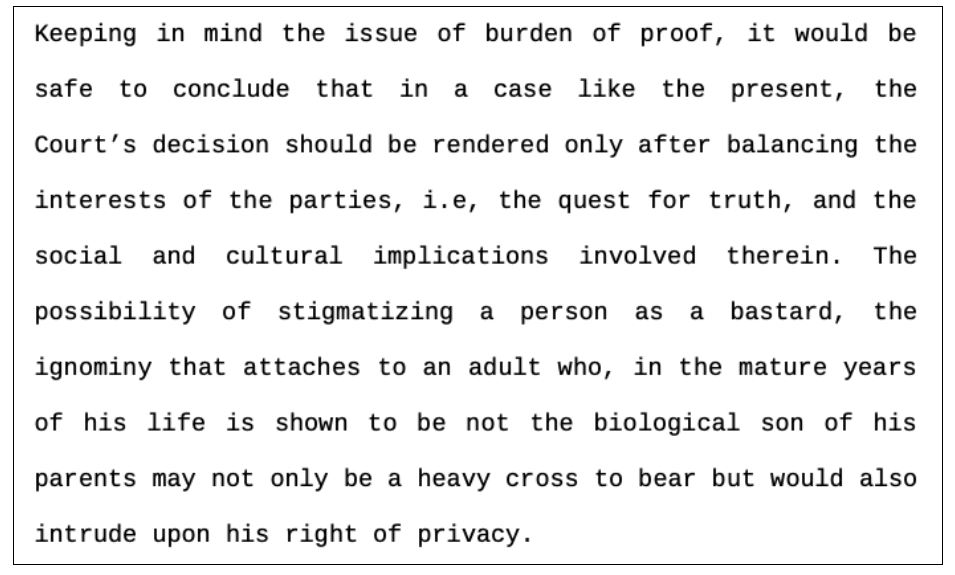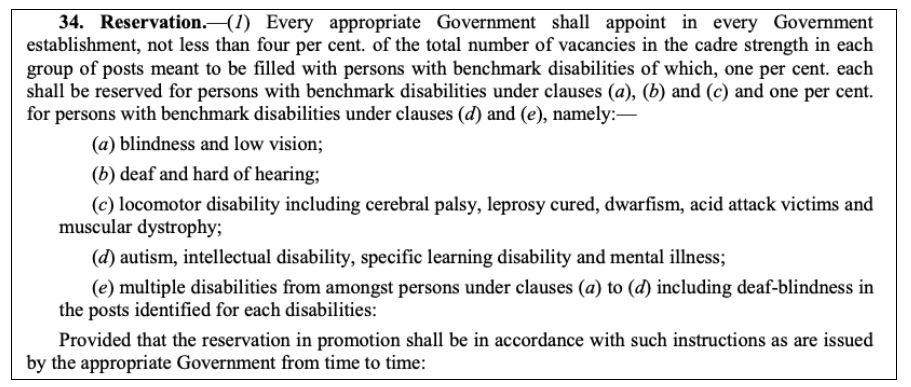In this roundup of court judgements, we look at Constitutional Courts’ remarks & directions on implication of DNA tests on personal liberty, providing Braille textbooks for all children with special needs, reservation in promotions to PwDs, and providing ex-gratia payment for COVID-19 deaths irrespective of the cause of death mentioned in the death certificate.
Supreme Court: Forcing unwilling party to undergo DNA test impinges on personal liberty and right to privacy.
In the case Ashok Kumar Vs. Raj Gupta and others, the Supreme Court observed that forcing an unwilling party to undergo a DNA test impinges on personal liberty and right to privacy.
The court was hearing a property dispute case, wherein the plaintiff claimed to be the son of late Trilok Chand Gupta and Sona Devi and was seeking a declaration of ownership of property left behind by them. The late couple’s daughters are defendants in the suit. During the trial, the defendants filed an application seeking to direct the plaintiff to undergo a DNA test to establish his biological link with late Trilok Chand Gupta and late Sona Devi. The plaintiff objected to this and pointed out that he has produced adequate documentary evidence to support his claim.
The trial court dismissed the application saying that the plaintiff cannot be compelled to undergo the test. Challenging the trial court’s dismissal, the defendants filed an appeal before the High Court, which directed the plaintiff to undergo the DNA test. Against the High Court order, the plaintiff approached the Supreme Court.
The apex court explored whether the plaintiff, without subjecting himself to a DNA test, is entitled to establish his right over the property through other material evidence.

The Court noted that it has been held in Banarsi Dass V. Teeku Dutta that a DNA test is not to be directed as a matter of routine but only in deserving cases. Keeping in mind the issue of burden of proof, the bench of Hrishikesh Roy observed that in the present case, the Court’s decision should be rendered only after balancing the quest for truth, and the social and cultural implications involved therein.
The Supreme Court held that the trial court correctly dismissed the request for DNA testing. The plaintiff had produced SSLC (Secondary School Leaving) Certificate, domicile certificate to show his biological link with the parents. Therefore, the judgement observed that forcing an unwilling party to undergo a DNA test impinges on personal liberty and right to privacy and held that the case will have to be ultimately decided based on the quality of evidence adduced by the plaintiff.
Karnataka HC: Directed the State to provide Braille textbooks to children with special needs within a period of 15 days.
In the case National Federation Of The Blind, Karnataka Vs. State Of Karnataka, the Karnataka high court has directed the State Government to provide Braille textbooks for all children with special needs (visual disabilities) within a period of 15 days, starting from 17 September 2021.
The high court was hearing a petition filed by the National Federation of the Blind, Karnataka on behalf of the children who are specially-abled. The petitioner contended that in the State of Karnataka, textbooks are not available in Braille, and they have also not been uploaded on the website in PDF form so that a printout can be taken in Braille.
In its earlier order (dated 18 March 2020), a memo was filed by the state government before the high court where it was described that the Karnataka Textbook Society has already provided the PDF files of Classes 1-10 (Kannada medium) to Braille Press, Mysuru. The memo also mentioned that the printing press is preparing the textbooks in Braille, and they will be available from the next academic year. The memo also highlighted that the textbooks for children with visual disabilities will be provided as per the indent given by Samagra Shiksha Karnataka.
After considering the submissions, the bench of acting Chief Justice Satish Chandra Sharma and Justice Sachin Shankar Magadum directed the State government to fulfil the statement made by it last year and provide Braille textbooks for all children with special needs (visual disabilities) within a period of 15 days. The court further directed the State to file a compliance report. The matter has been posted for further hearing on 07 October 2021.
Supreme Court: Directs centre to issue instructions to implement reservation in promotions for PwDs within 4 months.
In the case Siddaraju Vs. State of Karnataka, the Supreme Court directed the Union of India to issue instructions “at the earliest and not later than four months”, in accordance with the provision in Section 34 of the Right of Persons with Disabilities Act, 2016 for giving reservation in promotions to persons with disabilities.

The apex court was hearing a Miscellaneous Application filed by the Central Government seeking clarification with respect to Supreme Court’s judgement in Siddaraju Vs. State of Karnataka case, which declared that Persons with Disabilities (PwD) have right to reservation in promotions.
The bench Justices L Nageswara Rao, B.R.Gavai and Sanjiv Khanna clarified the judgement and directed the Centre to issue instructions in terms of provisions in Section 34 of the 2016 Act for implementing reservation in promotions for PwDs.
On a previous hearing date, the apex court heard the arguments of Senior Advocate Jayna Kothari who submitted that the Centre was seeking to undo the effect of judgments under the guise of seeking clarification. The Additional Solicitor General of India (ASG) asserted that principles of merit, efficiency and adequacy of representation must be considered before extending the benefit of reservation in promotion across the board.
The ASG argued that the widespread application of reservation in promotion for persons with disabilities across the board will lead to several practical problems. She pointed out that for lateral induction from State Civil Services to Indian Administrative Services, there is no SC/ST/OBC reservation. Therefore, applying PwD reservation for such lateral induction will be anomalous. She further submitted that in the Group A category, there are several layers without quota. Reservations for SC/ST/OBC are given only in the lower rungs in Group A. Hence, there needs to be a clarification if the PwD quota in promotions applies to all Group A posts.
On the petitioner’s side, Advocate Rajan Mani submitted that 5 years have elapsed since the Right of Persons with Disabilities Act, 2016 came into force, however, no instructions have been issued for Section 34 of the Act. He submitted that the implementation of reservation for PWDs is being delayed because no instructions are being issued, even after the court’s earlier judgement.
Taking all submissions into consideration, the apex court observed that it found no reasons to issue any clarifications as sought by the Union. In conclusion, the bench directed the Central Government to issue instructions as provided under section 34 of the Persons with Disabilities Act, 2016 not later than 4 months from the date of the order.
Supreme Court: States should not deny ex-gratia for COVID-19 deaths on grounds that the death certificate does not mention COVID-19 as the cause of death.
In the case Gaurav Kuma Bansal Vs. Union of India, the Supreme Court ordered that no State should deny the ex-gratia compensation of Rs. 50,000 to the kin of persons who died of COVID-19 on the sole ground that the death certificate does not mention COVID-19 as the cause of death.
The Court highlighted that as per the National Disaster Management Authority (NDMA) guidelines, the following cases are to be treated as COVID deaths:
- Diagnosed as COVID-19 positive through a positive RT-PCR/Molecular Tests/RAT or clinically determined through investigations in a hospital/in-patient facility by a treating physician, while admitted in the hospital/in-patient facility.
- Deaths occurring within 30 days from the date of testing or from the date of being clinically determined as a COVID-19 case shall be treated as ‘deaths due to COVID-19’, even if the death takes place outside the hospital/in-patient facility.
- COVID-19 case while admitted in the hospital/in-patient facility and who continued to be admitted beyond 30 days and died subsequently.
- COVID-19 cases which are not resolved and have died either in the hospital settings or at home, and where a Medical Certificate of Cause of Death (MCCD) in Form 4 & 4A has been issued to the registering authority, as required under Section 10 of the Registration of Birth & Death (RBD) Act, 1969, shall also be treated as COVID-19 death.
Therefore, irrespective of the cause of death mentioned in the death certificate, if a family member satisfies the above eligibility criteria mentioned, no State shall deny the ex-gratia payment of Rs. 50,000 on the production of requisite documents.
The bench of Justices MR Shah and AS Bopanna also clarified that the next kin of the deceased shall be paid an amount of Rs. 50,000 from the State Disaster Response Funds and it will be over and above the amounts paid by centre and state under various benevolent schemes. Such an amount is to be disbursed within 30 days of submitting an application and required documents.
In case of denial or non-receipt of the ex-gratia payment, the aggrieved claimant can approach the Grievance Redressal Committee. The Committee shall examine the contemporaneous medical record of the deceased patient and take a decision within a period of 30 days.
As per the NDMA guidelines, the Grievance Redressal Committee at the district level consists of an Additional District Collector, Chief Medical Officer of Health (CMOH), Additional CMOH/Principal or HOD Medicine of a Medical College (if one existing in the district) and a subject expert. The Committee has powers to call for the details/documents from the concerned hospitals.
The court also directed that all concerned hospitals where the patient was admitted and given
treatment shall provide all the necessary documents of treatment etc. to the family member of the deceased, as and when demanded. If any hospital and/or the place where the deceased had taken treatment refuses to furnish such documents, it will be open for the Grievance Redressal Committee to call for such information and the concerned hospital/institution where the deceased was admitted must furnish all the details as required for the purpose of establishing that the death was due to COVID-19.
In case of a family member of the deceased being aggrieved by the cause of death mentioned in the death certificate already issued, they can move the appropriate authority who issued the death certificate and/or registering authority with necessary documents. If the person is still aggrieved, they can approach the Grievance Redressal Committee and the concerned registering authority shall ratify/amend the death certificate as directed by the Grievance Redressal Committee.


